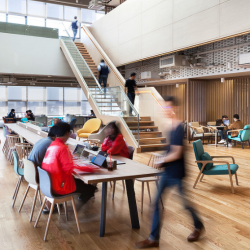To provide the best experiences, we use technologies like cookies to store and/or access device information. Consenting to these technologies will allow us to process data such as browsing behaviour or unique IDs on this site. Not consenting or withdrawing consent, may adversely affect certain features and functions.
The technical storage or access is strictly necessary for the legitimate purpose of enabling the use of a specific service explicitly requested by the subscriber or user, or for the sole purpose of carrying out the transmission of a communication over an electronic communications network.
The technical storage or access is necessary for the legitimate purpose of storing preferences that are not requested by the subscriber or user.
The technical storage or access that is used exclusively for statistical purposes.
The technical storage or access that is used exclusively for anonymous statistical purposes. Without a subpoena, voluntary compliance on the part of your Internet Service Provider, or additional records from a third party, information stored or retrieved for this purpose alone cannot usually be used to identify you.
The technical storage or access is required to create user profiles to send advertising, or to track the user on a website or across several websites for similar marketing purposes.
 Hardworking professionals are feeling the effects of longer working days and unpaid overtime, according to new research by law firm, Wright Hassall. The study claims that on average workers are performing nine or more hours of overtime in a given week, which totals more than one working day, compared to just three or more hours before the start of the pandemic. The research also claims that more than half (52 percent) are actually doing so without being paid for this. More →
Hardworking professionals are feeling the effects of longer working days and unpaid overtime, according to new research by law firm, Wright Hassall. The study claims that on average workers are performing nine or more hours of overtime in a given week, which totals more than one working day, compared to just three or more hours before the start of the pandemic. The research also claims that more than half (52 percent) are actually doing so without being paid for this. More →





 Avison Young, realestateworks and HLM Architects have launched
Avison Young, realestateworks and HLM Architects have launched 
 Hardworking professionals are feeling the effects of longer working days and unpaid overtime, according to new research by law firm,
Hardworking professionals are feeling the effects of longer working days and unpaid overtime, according to new research by law firm, 
 When it comes to job satisfaction, Denmark tops the list of the best places to work in digital in Europe – beating the UK, Germany and France – according to the 2020 Digital Talent Global Work Happiness Index. The Nordic country scored highly for work-life balance, family-friendly working models, purpose, personal safety and personal impact, which describes how much impact an individual feels they are making to their business.
When it comes to job satisfaction, Denmark tops the list of the best places to work in digital in Europe – beating the UK, Germany and France – according to the 2020 Digital Talent Global Work Happiness Index. The Nordic country scored highly for work-life balance, family-friendly working models, purpose, personal safety and personal impact, which describes how much impact an individual feels they are making to their business. 
 A survey issued by architecture, design, and planning firm
A survey issued by architecture, design, and planning firm 
 GlobalWebIndex (GWI), together with LinkedIn’s B2B Institute, has launched “
GlobalWebIndex (GWI), together with LinkedIn’s B2B Institute, has launched “


 A new report, released by workplace design consultancy,
A new report, released by workplace design consultancy, 
 2020 has been the most stressful year in history for the global workforce and people want robots to help, according to a new study by
2020 has been the most stressful year in history for the global workforce and people want robots to help, according to a new study by 


 Flexible working arrangements are those which ‘allow employees to vary the amount, timing or location of their work’ and may include part-time working, mobile/home working, compressed hours or job-sharing – among others. Before the lockdown, according to the Chartered Institute of Personnel Development (CIPD), more than half of all employees in the UK used at least one form of flexible working, while a study by Gallup in the US suggests as many as 43 percent of employees already worked flexibly. The practice has been found to have positive effects on job satisfaction, employee commitment, reducing work-family conflict – and for many is now an essential component of modern working life.
Flexible working arrangements are those which ‘allow employees to vary the amount, timing or location of their work’ and may include part-time working, mobile/home working, compressed hours or job-sharing – among others. Before the lockdown, according to the Chartered Institute of Personnel Development (CIPD), more than half of all employees in the UK used at least one form of flexible working, while a study by Gallup in the US suggests as many as 43 percent of employees already worked flexibly. The practice has been found to have positive effects on job satisfaction, employee commitment, reducing work-family conflict – and for many is now an essential component of modern working life. 









September 21, 2020
Time to get on board with the psychological effects of working from home
by Jörg Bakschas • Comment, Flexible working, Wellbeing